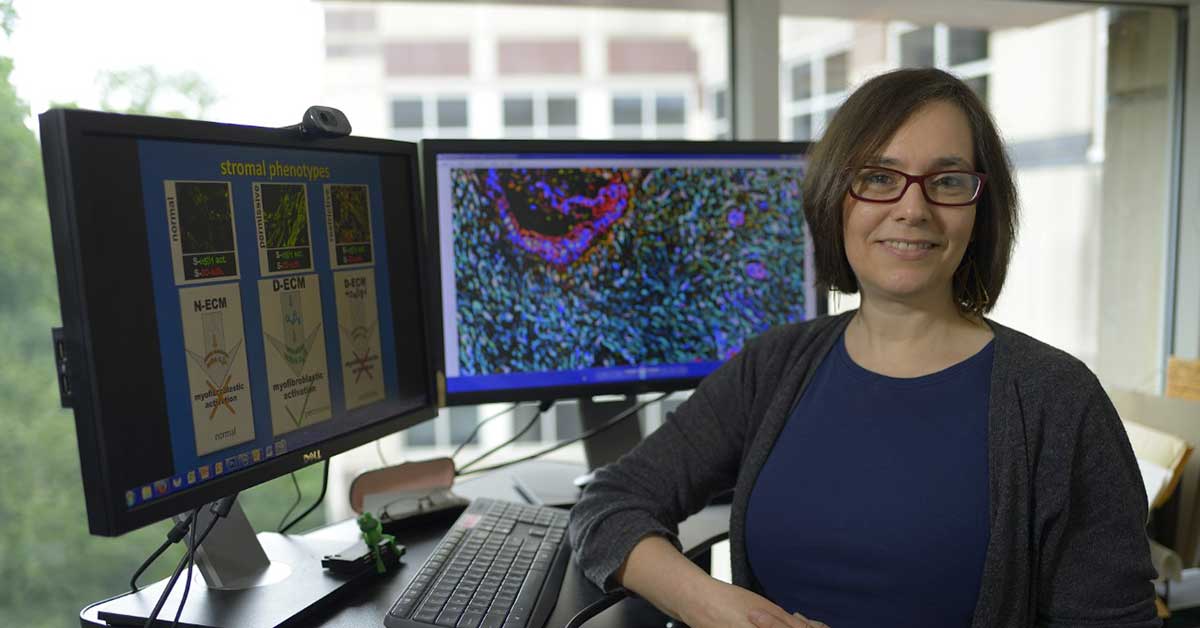
PHILADELPHIA (September 2 2022)—In a recent study, researchers at Fox Chase Cancer Center demonstrated how cancer cells can survive in the body even when faced with a lack of sufficient nutrition, a finding that could be used as a potential indicator of disease status in the organs of pancreatic cancer patients.
The work was first conceptualized by Kristopher Raghavan, PhD, lead author of the study, who at the time was a graduate student in the lab of Edna “Eti” Cukierman, PhD, co-director of the Marvin and Concetta Greenberg Pancreatic Cancer Institute at Fox Chase.
Raghavan sought to determine the characteristics of extracellular vesicles, which are generated by tumor-supporting cells, and the role they play in providing nutrition to pancreatic cancer cells. Extracellular vesicles are small structures released by all cells that deliver selected sets of molecules to recipient cells, thus altering the recipient cells’ functions.
“These vesicles serve as package-like delivery of cellular materials systems that not only include numerous molecules inside them but also have exposed receptors on their surface. In some ways, these vesicles are much more effective than single traveling molecules because they encompass a full code of intended delivery signals. It is a much more sophisticated way for cells to communicate, locally and systemically, with other cells in the human body,” said Cukierman.
One of the unique aspects of pancreatic cancer is its stroma—its supporting tissue. The presence of stroma, including a characteristic fibrous protein network, causes the collapse of local vessels, making the environment surrounding the tumor a poor source of sustained nutrition.
However, this stroma is filled with cancer-associated fibroblasts, the type of cell present in pancreatic cancer that generates the fibrous network and secretes multiple substances, including small extracellular vesicles.
Through this study, Raghavan, Cukierman, and their colleagues were able to take cancer-associated fibroblasts from patient samples and grow them as functional units by culturing them in their self-generated fibrous networks. They then isolated the secreted vesicles before comparing them with those from non-pathogenic fibroblast units.
They found that even when pancreatic cancer cells are surrounded by an environment that provides them with poor nutrition, they can survive through the support of the material contained within extracellular vesicles generated by the cancer-associated fibroblast units.
Cukierman said an additional finding of the study was that in order for the extracellular vesicles to effectively help cancer cells survive, the cancer-associated fibroblasts must express the protein Netrin G1, a stroma target discovered by the Cukierman lab in 2021. Interestingly, this and another receptor protein were uniquely detected in the vesicles isolated by the tumor supportive cancer-associated fibroblasts.
“We also compared blood samples from cancer patients and from healthy donors, isolated vesicles from these samples, and looked for the same receptor protein biomarkers. To our surprise, we observed that these two unique receptor proteins were much higher in vesicles from patients with cancer,” Cukierman said. The results were significant enough for the research team to look for these biomarkers in ongoing clinical trials.
“This is exciting because it will help us see if we’re changing the tumor stroma so it no longer supports the cancer based on the types of systemic vesicles we find circulating in patients’ blood,” Cukierman said.
The study, “NetrinG1+ Cancer-Associated Fibroblasts Generate Unique Extracellular Vesicles That Support the Survival of Pancreatic Cancer Cells Under Nutritional Stress,” was published in Cancer Research Communications.